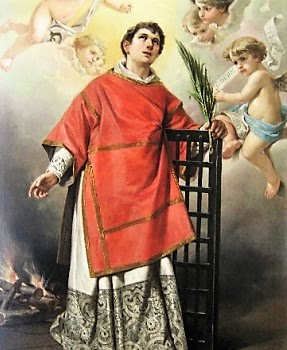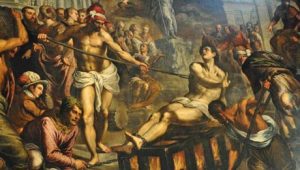
10 August
Feast
St. Lawrence, Deacon and Martyr (225-258)
Born: 225, Osca, Hispania (now modern-day Spain)
Died: August 10, 258, Rome
Major Shrine: Basilica di San Lorenzo fuori le Mura in Rome
Patron of: Rome, comedians, librarians, students, tanners, chefs
Lawrence was chief among the seven deacons who served the Roman Church during the mid-third century. The young cleric held a position of great trust, caring for the goods of the Church and distributing its alms among the poor. He was arrested under the Emperor Valerian in 258, laid upon a gridiron and slowly roasted to death. Lawrence rejoiced in his awful martyrdom and died praying for the conversion of the city of Rome, in the hope that from it the faith of Christ might spread throughout the world. From that time idolatry began to decline in Rome.
COLLECT PRAYER
O God, giver of that ardor of love for you by which Saint Lawrence was outstandingly faithful in service and glorious in martyrdom, grant that we may love what he loved and put into practice what he taught. Through our Lord Jesus Christ, your Son, who lives and reigns with you in the unity of the Holy Spirit, God, for ever and ever.
Things to Do:
- St. Lawrence was a deacon in the early Church, not a priest. The word deacon comes from the Greek word “diakonia,” which means service. Deacons of the early Church often helped widows, orphans, the poor and the elderly. If there is someone elderly in your family try to do something nice for them today. If not pay a visit to a local nursing home and cheer someone up.
- From the Catholic Culture library: St. Lawrence: Proto-Deacon of the Roman Church.
- Many times we do not realize how important patron saints are in various parts of the world. For example in GOA (south of Bombay, India), where the people are poor in material possessions, the feast of St. Lawrence marks the beginning of the fishing season and the vessels used are blessed by the priest. Make a donation to the poor box and remember to pray for those who live in less developed countries.
St. Lawrence
This young deacon and heroic martyr is numbered among those saints who were most highly venerated by the ancient Roman Church. Next to the feast of Sts. Peter and Paul, that of St. Lawrence ranked highest in the Roman sanctoral cycle.
“From the rising of the sun unto its setting,” says St. Leo, “whenever the glory of Levites beams forth in splendor, Rome is deemed no less illustrious because of Lawrence than Jerusalem because of Stephen.”
Even though we have no genuine account of St. Lawrence’s martyrdom, we do possess considerable evidence from most ancient times regarding the particulars of his passion. Legendary Acts tell how Lawrence was a disciple of Pope Sixtus II (257-258), who dearly loved him because of his special talents, but principally because of his innocence; in spite of his youth, the Pope numbered him among the seven deacons of Rome and raised him to the position of archdeacon. As such, Lawrence had the immediate care of the altar and was at the side of the saintly Pope whenever he offered the holy Sacrifice; to him also was confided the administration of the goods of the Church and the responsibility of caring for the poor.
During the persecution of Emperor Valerian (253-260), Sixtus II and his four deacons were martyred. Very ardently Lawrence desired to die with his spiritual father and therefore said to him:
“Father, where are you going without your son? Where are you hastening, O priest, without your deacon? Never before did you offer the holy Sacrifice without assistants. In what way have I displeased you? In what way have you found me unfaithful in my office? Oh, try me again and prove to yourself whether you have chosen an unworthy minister for the service of the Church. So far you have been trusting me with distributing the Blood of the Lord.”
This loving complaint of joyous self-oblation Sixtus answered with words of prophecy:
“I am not forsaking you, my son; a severer trial is awaiting you for your faith in Christ. The Lord is considerate toward me because I am a weak old man. But for you a most glorious triumph is in store. Cease to weep, for already after three days you will follow me”.
After these comforting words he admonished him to distribute all the remaining Church goods allocated to the poor. While Lawrence was dispersing these items in the house of a certain Narcissus, a blind man named Crescentius asked for healing help by the imposition of hands. The holy deacon made the Sign of the Cross over him and the man began to see.
From his relations with Pope Sixtus, it was known that he acted as the steward over the Church’s property. He was arrested therefore and placed under the watch of a certain Hippolytus. There in prison Lawrence cured the blind Lucillus and several other blind persons; impressed thereby, Hippolytus embraced the faith and died a martyr. Ordered by the authorities to surrender the treasures of the Church, Lawrence asked for two days time during which to gather them. The request was granted and he brought together in the house of Hippolytus the poor and the sick whom he had supported. These he led to the judge.
“Here are the treasures of the Church!”

Lawrence was tortured, scourged, and scorched with glowing plates. In the midst of excruciating pain he prayed:
“Lord Jesus Christ, God from God, have mercy on Your servant!”
And he besought the grace of faith for the bystanders. At a certain point the soldier Romanus exclaimed:
“I see before you an incomparably beautiful youth. Hasten and baptize me.”
He had observed how an angel dried the wounds of Lawrence with a linen cloth during his passion.
Again during the night he was dragged before the judge and threatened with immediate death. But he replied:
“My God I honor and Him alone I serve. Therefore I do not fear your torments; this night shall become as brightest day and as light without any darkness.”
When placed upon the glowing gridiron, he jested with his executioners and the cruel tyrant.
“Now you may turn me over, my body is roasted enough on this side.”
Shortly after this had been done, he cried again:
“At last I am finished; you may now take from me and eat.”
Then turning to God in prayer:
“I thank You, O Lord, that I am permitted to enter Your portals.”
To comfort him during his torments God said to him:
“My servant, do not be afraid. I am with you.”
He was put to death upon the Viminal Hill and buried on the Tiburtinian Way.
Such the passion and death of this Christian hero, a story that in the Roman Breviary is told by the antiphons and responsories. Already in Constantine’s time there was erected over his grave a church that belonged to the seven major basilicas of Rome, St. Lawrence Outside the Walls.
Excerpted from The Church’s Year of Grace, Pius Parsch
Source: Catholic Culture